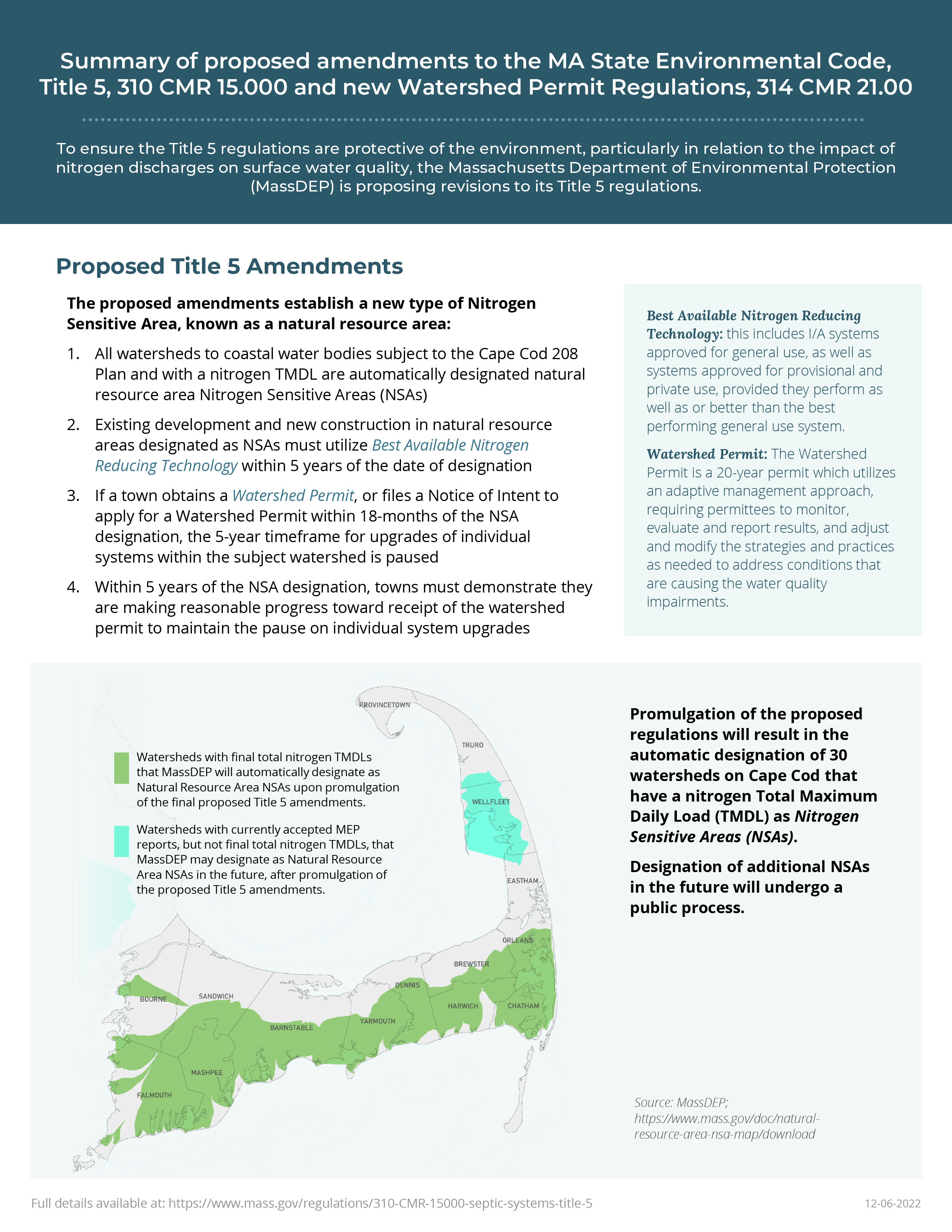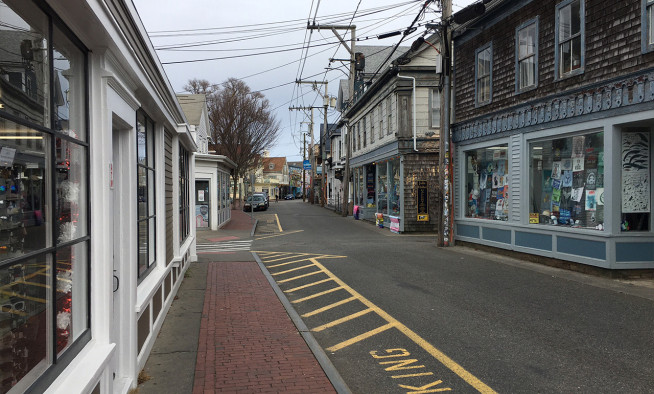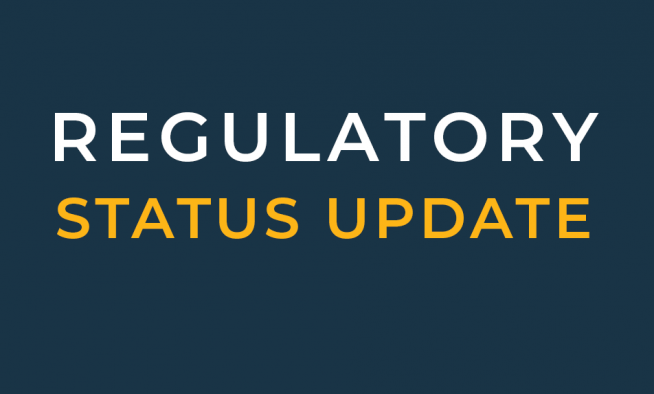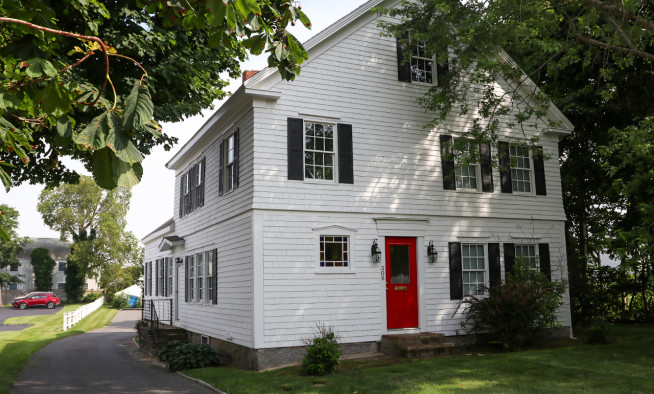Understanding MassDEP’s proposed nitrogen reduction regulatory changes
Cape Cod communities are making strides to reduce nitrogen flow into our coastal waters, and now local leaders are reviewing a pair of proposals designed to encourage watershed-based comprehensive planning and implementation.
The Commonwealth of Massachusetts Title 5 regulations establish minimum standards for the proper siting, construction, upgrade, and maintenance of septic systems and the appropriate means for the transport and disposal of septage in order to protect public health, safety, welfare and the environment. The Massachusetts Department of Environmental Protection (MassDEP) is proposing to amend the Title 5 regulations to enhance protection of embayments and estuaries—particularly on Cape Cod, the Islands and Southeastern Massachusetts—from eutrophication caused by nitrogen pollution, primarily from wastewater.
This is complemented by the proposed promulgation of new regulations to provide for a watershed permitting approach to control nitrogen and other pollutants from entering the embayments and estuaries.
The two regulatory initiatives would work in tandem to reduce nitrogen loads. MassDEP is proposing to revise the Title 5 regulations to establish natural resource area “Nitrogen Sensitive Areas” (NSAs) for watersheds adversely impacted by nitrogen. Septic systems located within designated NSAs would be required to upgrade to the best-available, nitrogen-reducing technology within 5 years of designation, unless the community in which the septic system is located obtains a Watershed Permit for the watershed or files a Notice of Intent for a Watershed Permit.
Watershed permits for holistic planning
A watershed permit establishes performance standards, authorized activities, and timeframes under an adaptive management framework to meet water quality and habitat restoration goals. The watershed permit is based on a long-term plan, such as a Comprehensive Wastewater Management Plan or a Targeted Watershed Management Plan. A watershed permit allows towns to demonstrate their commitment to reducing nitrogen load and improving overall water quality.
MassDEP is proposing to provide a voluntary 20-year permit for communities to implement long-term wastewater plans most efficiently and effectively for the entire watershed.
The Area Wide Water Quality Management Plan (208 Plan) recommends the development of watershed permitting. The Pleasant Bay Watershed Permit, established in 2018, provides a successful example.
A watershed permit provides flexibility for towns to design a plan consistent with the needs of the local communities within a watershed. It enables them to take a holistic, long-term, and innovative approach to reducing nitrogen loads, and provides enforcement forbearance for the length of the permit itself. Any local government is eligible to apply, and communities may apply jointly, provided they first execute an enforceable intermunicipal agreement that confirms the share of responsibility within a watershed.
These watershed permit regulations align with the watershed-based approach of the 208 Plan.
Updating Title 5
Proposed changes to the Title 5 regulations, if promulgated, would automatically designate thirty Cape Cod watersheds spanning 11 different communities as a newly established category of NSAs called natural resource areas. These new natural resource area NSAs are watersheds to coastal water bodies subject to the Cape Cod 208 Plan that have an established final total maximum daily load (TMDL) for nitrogen.
Under the proposed changes, existing development and new construction must upgrade to the best available nitrogen-reducing technology within five years. Best-available technology is defined as those systems approved for general use that achieve the lowest possible nitrogen removal, or systems approved for provisional or pilot use, provided they meet the same nitrogen removal as the lowest general-use system.
Watershed permits provide opportunities
Upgrading the estimated 86,000 systems within the newly defined NSAs in a five-year time frame would be a daunting task for our community. However, this process could be halted if towns apply for watershed permits. The proposed Title 5 amendments and the accompanying watershed permit regulations are an effort to encourage towns to pursue watershed permits, implement targeted strategies, and look at more comprehensive wastewater planning.
The Cape Cod Commission is available to provide support to communities as they develop their plans and go through the watershed permitting process.
A summary of these regulatory initiatives, links to MassDEP resources, and details on the public comment period are available at https://cccom.link/title5.
How to Comment
MassDEP is hosting two upcoming virtual Public Hearings:
- Remote Only, January 24, 2023 at 6:00 p.m. Register
- Remote Only, January 25, 2023 at 6:00 p.m. Register
Oral comments will be received at the above public hearings, and written comments can be submitted via mail and email through January 30, 2023.
Email comments to dep.talks@mass.gov. Please put “Title 5 and Watershed Permitting” in the subject line.
Mail comments to: MassDEP, Bureau of Water Resources – Division of Watershed Management, 100 Cambridge Street, suite 900, Boston, MA 02114, Attention: Title 5 & Watershed Permit.
MassDEP also intends to hold two additional information sessions:
- January 17, 2023 at 6:00 p.m. (remote)
- January 18, 2023 at 6:00 p.m. (hybrid).
More information about how to participate in these sessions will be provided on MassDEP’s website.
The draft regulations are published on the MassDEP website at: https://www.mass.gov/info-details/massdep-public-hearings-comment-opportunities and at: 310 CMR 15.000: Septic Systems ("Title 5") | Mass.gov and 314 CMR 21.00: Watershed Permit Regulations | Mass.gov
Recordings of previously held information sessions and public hearings can be found here: 310 CMR 15.000: Septic Systems ("Title 5") | Mass.gov





